british
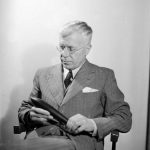
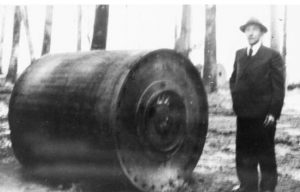 We have all tried our hand at skipping stones across the water, but who would have thought that such an idea could be applied to a bomb, or that it would ultimately become extremely successful in accomplishing its given task…destroying German dams and hydroelectric plants along the Ruhr valley.
We have all tried our hand at skipping stones across the water, but who would have thought that such an idea could be applied to a bomb, or that it would ultimately become extremely successful in accomplishing its given task…destroying German dams and hydroelectric plants along the Ruhr valley.
During World War II, the Allies we’re desperate to cut off energy to the Nazi war machine, so the Allied engineers were given the task of finding a way to breach the defenses surrounding the dams and hydroelectric plants. In the end, it was British engineer, Barnes Wallis who came through with what he called “bouncing bombs.” To watch it in action, one is reminded of skipping stones like most of us have done in the past. In similar fashion, the bomb skips along the water bouncing over the torpedo nets to hit its target.
When World War II began, Germany had the undisputed upper hand when it came to water-based warfare with 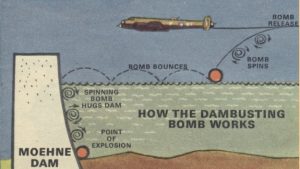
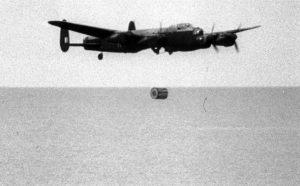 their deadly U-boats and defensive “torpedo nets” placed strategically in front of their energy-creating dams. This made it next to impossible to hit the dams with the traditional torpedo. The British Royal Air Force was determined to take out these German battlements, as they slowly wore the Axis of Evil down.
their deadly U-boats and defensive “torpedo nets” placed strategically in front of their energy-creating dams. This made it next to impossible to hit the dams with the traditional torpedo. The British Royal Air Force was determined to take out these German battlements, as they slowly wore the Axis of Evil down.
The problem was, how to somehow get past the torpedo nets, to destroy the dams and their hydroelectric plants. Wallis had to figure out how to bypass the torpedo nets, in order to make direct contact with the wall of the dams. It seemed like an insurmountable task. After dwelling on the problem for a while, Wallis seized on 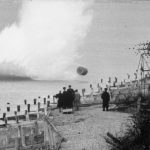
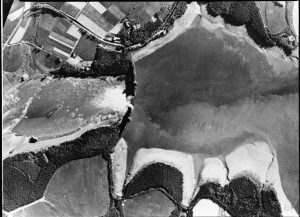 the potential of the Magnus effect, which would bounce a bomb across the water like a skipping stone.
the potential of the Magnus effect, which would bounce a bomb across the water like a skipping stone.
The theory was to create backspin, which would counter the gravity and send the bomb skimming over the water. Once it bounced over the torpedo net, it hit the designated target. The plan seemed plausible, and the Royal Air Force commenced Operation Chastise on May 16, 1943. The results were spectacular!! As it turned out, Barnes Wallis really knew his stuff.
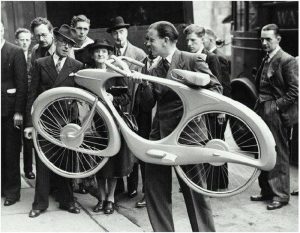
 Today it would be worth about $4750. Would you pay that much for a bicycle? I don’t think I would, but then I don’t suppose I would be buying a bicycle called the Spacelander. Still, if I was, $4750 would be the asking price, or something close to that number. The Spacelander was created by Benjamin Bowden, who was born June 3, 1906. He was a British industrial designer, whose specialty was automobiles and bicycles. He received violin training at Guildhall, and completed a course in engineering at Regent. Bowden designed the coachwork of Healey’s Elliott, an influential British sports car.
Today it would be worth about $4750. Would you pay that much for a bicycle? I don’t think I would, but then I don’t suppose I would be buying a bicycle called the Spacelander. Still, if I was, $4750 would be the asking price, or something close to that number. The Spacelander was created by Benjamin Bowden, who was born June 3, 1906. He was a British industrial designer, whose specialty was automobiles and bicycles. He received violin training at Guildhall, and completed a course in engineering at Regent. Bowden designed the coachwork of Healey’s Elliott, an influential British sports car.
In 1925 Bowden began working as an automobile designer for the Rootes Group. By the late 1930s, Bowden was the chief body engineer for the Humber car factory in Coventry. During World War II, his design of an armored car was used by Winston Churchill and George VI for their protection. In 1945, he left the Rootes Group, and with partner John Allen, formed his own design company in Leamington Spa. The studio was one of the first such design firms in Britain. Bowden designed the body of Healey’s Elliott in 1947. It was the first British car to break the 100 mile per hour barrier. Working with Achille Sampietro who created the chassis, Bowden drew the initial design for the auto directly onto the walls of his house. Unusual…yes, but it worked for him, I guess. Shortly before his departure to the United States Bowden penned a sketch design for a two-seater sports racing prototype, the Zethrin Rennsport, being developed by Val Zethrin. This used the same wheelbase as the short-chassis Squire Sports, and was dressed in a contemporary, streamlined body. This design theme was carried through to his future work on the early Chevrolet Corvette and Ford Thunderbird.
He went on to design the Spacelander in 1946. It was a space-age looking bicycle, that was ahead of its time, since space travel wouldn’t occur for two decades. It’s not that the Spacelander would ever be used in space, but rather the design that seemed space-like. Bowden called the bicycle the Classic. In the early or mid 1950s, Bowden moved to Michigan, in the United States. While in Muskegon, Michigan in 1959, he met with Joe Kaskie, of the George Morrell Corporation, a custom molding company. Kaskie suggested molding the bicycle in fiberglass instead of aluminum, but the fiberglass frame was relatively fragile, and its unusual nature made it difficult to market to established bicycle distributors. Although he retained the futuristic appearance of the Classic, Bowden abandoned the hub dynamo, and replaced the drive-train with a more common sprocket-chain assembly. The new name, Spacelander, was chosen to capitalize on interest in the Space Race. Financial 
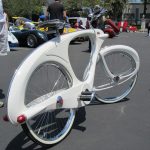 troubles from the distributor forced Bowden to rush development of the Spacelander, which was released in 1960 in five colors: Charcoal Black, Cliffs of Dover White, Meadow Green, Outer Space Blue, and Stop Sign Red. The bicycle was priced at $89.50, which made it one of the more expensive bicycles on the market. Only 522 Spacelander bicycles were shipped before production was stopped, although more complete sets of parts were manufactured. In more recent years, the Spacelander has become a collector’s item…hence the price tag.
troubles from the distributor forced Bowden to rush development of the Spacelander, which was released in 1960 in five colors: Charcoal Black, Cliffs of Dover White, Meadow Green, Outer Space Blue, and Stop Sign Red. The bicycle was priced at $89.50, which made it one of the more expensive bicycles on the market. Only 522 Spacelander bicycles were shipped before production was stopped, although more complete sets of parts were manufactured. In more recent years, the Spacelander has become a collector’s item…hence the price tag.
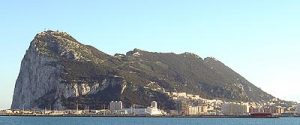 After reading about the rescue of Allied personnel from occupied France by smuggling them through Spain and then to the Rock of Gibraltar, I wanted to know more about this place. The story talked about the tunnels that basically created an underground city in the Rock of Gibraltar. The Rock was basically a huge underground fortress capable of accommodating 16,000 men along with all the supplies, ammunition, and equipment needed to withstand a prolonged siege. The entire 16,000 strong garrison could be housed there along with enough food to last them for 16 months. Within the tunnels there were also an underground telephone exchange, a power generating station, a water distillation plant, a hospital, a bakery, ammunition magazines and a vehicle maintenance workshop. Such a place in World War II would be almost impossible to penetrate with the weapons available in that day and age.
After reading about the rescue of Allied personnel from occupied France by smuggling them through Spain and then to the Rock of Gibraltar, I wanted to know more about this place. The story talked about the tunnels that basically created an underground city in the Rock of Gibraltar. The Rock was basically a huge underground fortress capable of accommodating 16,000 men along with all the supplies, ammunition, and equipment needed to withstand a prolonged siege. The entire 16,000 strong garrison could be housed there along with enough food to last them for 16 months. Within the tunnels there were also an underground telephone exchange, a power generating station, a water distillation plant, a hospital, a bakery, ammunition magazines and a vehicle maintenance workshop. Such a place in World War II would be almost impossible to penetrate with the weapons available in that day and age.
The tunnels of Gibraltar were constructed over the course of nearly 200 years, principally by the British Army. Within a land area of only 2.6 square miles, Gibraltar has around 34 miles of tunnels, nearly twice the length of its entire road network. The first tunnels were excavated in the late 18th century. They served as communication passages between artillery positions and housed guns within embrasures cut into the North Face of the Rock, to protect the interior city. More tunnels were constructed in the 19th century to allow easier access to remote areas of Gibraltar and accommodate stores and reservoirs to deliver the water supply of 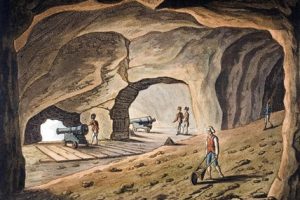
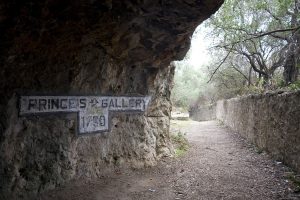 Gibraltar. At the start of World War II, the civilian population around the Rock of Gibraltar was evacuated and the garrison inside the facility was greatly increased in size. A number of new tunnels were excavated to create accommodation for the expanded garrison and to store huge quantities of food, equipment, and ammunition. The work was carried out by four specialized tunneling companies from the Royal Engineers and the Canadian Army. They created a new Main Base Area in the southeastern part of Gibraltar on the peninsula’s Mediterranean coast. It was chosen because it was shielded from the potentially hostile Spanish mainland. New connecting tunnels were created to link this with the established military bases on the west side. A pair of tunnels, called the Great North Road and the Fosse Way, were excavated running nearly the full length of the Rock to interconnect the bulk of the wartime tunnels.
Gibraltar. At the start of World War II, the civilian population around the Rock of Gibraltar was evacuated and the garrison inside the facility was greatly increased in size. A number of new tunnels were excavated to create accommodation for the expanded garrison and to store huge quantities of food, equipment, and ammunition. The work was carried out by four specialized tunneling companies from the Royal Engineers and the Canadian Army. They created a new Main Base Area in the southeastern part of Gibraltar on the peninsula’s Mediterranean coast. It was chosen because it was shielded from the potentially hostile Spanish mainland. New connecting tunnels were created to link this with the established military bases on the west side. A pair of tunnels, called the Great North Road and the Fosse Way, were excavated running nearly the full length of the Rock to interconnect the bulk of the wartime tunnels.
It was to this place that the French Resistance smuggled downed Allied airmen and other escapees from the Nazi regime inside France. Men like Staff Sergeant Arthur Meyerowitz and RAF Bomber Lieutenant R.F.W. Cleaver…two of the men who were smuggled out of occupied France by the French Resistance network known as Réseau Morhange which was created in 1943 by Marcel Taillandier in Toulouse. Taillandier was killed shortly after these two men were smuggled out. He had given his life to protect the airmen he smuggled out as well as to provide intelligence to England. For the airmen who made it to the Rock of Gibraltar, freedom awaited. While 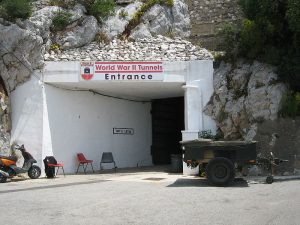
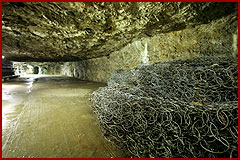 the road had been long and hard, the time spent at the Rock of Gibraltar meant safety, medical care, food, and warmth. It meant being able to let their family know that they were alive. It meant being able to go back to life, and maybe for some, to be able to live to fight another day. As the men were told upon arrival at the Rock of Gibraltar, “Welcome back to the war.”
the road had been long and hard, the time spent at the Rock of Gibraltar meant safety, medical care, food, and warmth. It meant being able to let their family know that they were alive. It meant being able to go back to life, and maybe for some, to be able to live to fight another day. As the men were told upon arrival at the Rock of Gibraltar, “Welcome back to the war.”
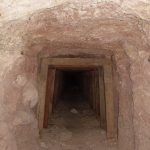
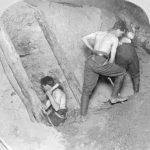 World War I found the British Army with a big problem. The German 4th Army was deeply entrenched at Messines Ridge in northern France, and the British had to remove them…somehow. The British came up with a plan, and for the 18 months prior to June 7, 1917, soldiers had been secretly working to place nearly 1 million pounds of explosives in tunnels under the German positions. The tunnels extended to some 2,000 feet in length, and some were as much as 100 feet below the surface of the ridge, where the German stronghold positions were located. The plan was put into action by the British 2nd Army under the supervision of General Sir Herbert Plumer. The joint explosion of the mines at Messines ranks among the largest non-nuclear explosions of all time. The evening before the attack, General Sir Charles Harington, Chief of Staff of the Second Army, remarked to the press, “Gentlemen, I don’t know whether we are going to make history tomorrow, but at any rate we shall change geography”.
World War I found the British Army with a big problem. The German 4th Army was deeply entrenched at Messines Ridge in northern France, and the British had to remove them…somehow. The British came up with a plan, and for the 18 months prior to June 7, 1917, soldiers had been secretly working to place nearly 1 million pounds of explosives in tunnels under the German positions. The tunnels extended to some 2,000 feet in length, and some were as much as 100 feet below the surface of the ridge, where the German stronghold positions were located. The plan was put into action by the British 2nd Army under the supervision of General Sir Herbert Plumer. The joint explosion of the mines at Messines ranks among the largest non-nuclear explosions of all time. The evening before the attack, General Sir Charles Harington, Chief of Staff of the Second Army, remarked to the press, “Gentlemen, I don’t know whether we are going to make history tomorrow, but at any rate we shall change geography”.
On June 7, 1917, they were ready to carry out their secret attack. The explosions created 19 large craters. It would be a crushing victory over the Germans who had no idea of the impending disaster they were about to face. This attack would mark the successful beginning of an Allied offensive designed to break the grinding stalemate on the Western Front in World War I. The time of the attack was set for 3:10am. Precisely on schedule, a series of simultaneous explosions rocked the area. The blast from the detonation of all those landmines was heard as far away as London. A German observer described the explosions, “nineteen gigantic roses with carmine petals, or enormous mushrooms, rose up slowly and majestically out of the ground and 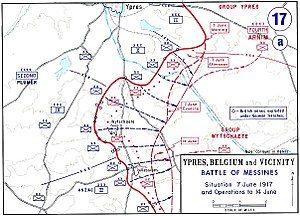
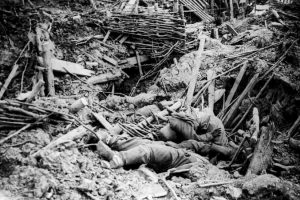 then split into pieces with a mighty roar, sending up multi-colored columns of flame mixed with a mass of earth and splinters high in the sky.” German losses that day included more than 10,000 men who died instantly, along with some 7,000 prisoners…men too stunned and disoriented by the explosions to resist the infantry assault.
then split into pieces with a mighty roar, sending up multi-colored columns of flame mixed with a mass of earth and splinters high in the sky.” German losses that day included more than 10,000 men who died instantly, along with some 7,000 prisoners…men too stunned and disoriented by the explosions to resist the infantry assault.
Although Messines Ridge battle was, itself was a relatively limited victory, it had a considerable effect on the German morale. The Germans were forced to retreat to the east, a sacrifice that marked the beginning of their gradual, but continuous loss of territory on the Western Front. It also secured the right flank of the British thrust towards the highly contested Ypres region, which was the eventual objective of the planned offensive. Over the next month and a half, British forces continued to push the Germans back toward the high ridge at Passchendaele, which on July 31 saw the launch of the British offensive known as the Battle of Passchendaele. The Battle of Messines marked the high point of mine warfare. On August 10, 1917, the Royal Engineers fired the last British deep mine of the war, at Givenchy-en-Gohelle near Arras.
The explosions left a mine crater 40 feet deep. The attack had done its job. Still, after the war was over, the crater remained, and some wanted to change the “feel” of the place. Nowadays, this mine crater is a serene, contemplative place. I’m sure that many who visit there feel the significance of the location, but also know just 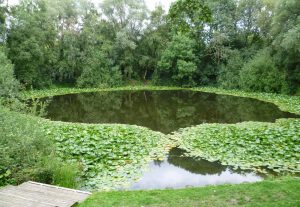 how necessary it was to ensure the freedom of France from the tyranny of the German forces. Named The Pool of Peace, it is a 40 foot deep lake near Messines, Belgium. It fills one of the craters made in 1917 when the British detonated a mine containing 45 tons of explosives. The pool stretches 423 feet across, and remains a place of solace that receives many visitors every year. It seems to me that, while most of those killed in the mine fields on June 7, 1917, were Germans, and therefore, the enemy, they were also people, many of whom didn’t want to be there any more than the Allies did. They were there under orders, and that was all there was to it. For that reason, I believe that place should be, finally, a place of peace.
how necessary it was to ensure the freedom of France from the tyranny of the German forces. Named The Pool of Peace, it is a 40 foot deep lake near Messines, Belgium. It fills one of the craters made in 1917 when the British detonated a mine containing 45 tons of explosives. The pool stretches 423 feet across, and remains a place of solace that receives many visitors every year. It seems to me that, while most of those killed in the mine fields on June 7, 1917, were Germans, and therefore, the enemy, they were also people, many of whom didn’t want to be there any more than the Allies did. They were there under orders, and that was all there was to it. For that reason, I believe that place should be, finally, a place of peace.
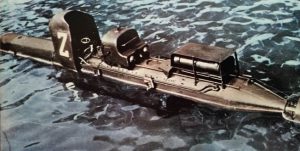 One of the weapons of naval warfare that all of us know about is the torpedo. Beginning in the 1870’s, torpedoes were rapidly introduced into the navies of many states and soon became the primary weapon of destroyers, submarines, and torpedo boats, cruisers, and ships of the line of that period were also armed with torpedoes. Torpedoes were first used by Russian vessels in the Russo-Turkish War of 1877–78. So torpedoes weren’t new on March 26, 1941, when Italy attacked the British fleet at Souda Bay, Crete, using these new detachable warheads. These torpedoes were different however, and I can only imagine how the men on the deck of the British cruiser must have felt as they watched the streaking torpedo coming toward them.
One of the weapons of naval warfare that all of us know about is the torpedo. Beginning in the 1870’s, torpedoes were rapidly introduced into the navies of many states and soon became the primary weapon of destroyers, submarines, and torpedo boats, cruisers, and ships of the line of that period were also armed with torpedoes. Torpedoes were first used by Russian vessels in the Russo-Turkish War of 1877–78. So torpedoes weren’t new on March 26, 1941, when Italy attacked the British fleet at Souda Bay, Crete, using these new detachable warheads. These torpedoes were different however, and I can only imagine how the men on the deck of the British cruiser must have felt as they watched the streaking torpedo coming toward them.
The difference between the torpedoes of old, and these new torpedoes, was that these were manned torpedoes. No, there weren’t men on the torpedo known as the Chariot.” Nevertheless it was unique. Primarily used to attack enemy ships still in harbor, the Chariots needed “pilots” to “drive” them to their targets…basically a guided missile system…but in a very primitive form. Sitting astride the torpedo on a vehicle that 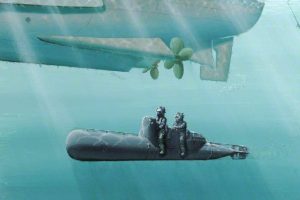 would transport them both, the pilot would guide the missile as close to the target as possible, then ride the vehicle back, usually to a submarine. The Chariot was an enormous advantage, because before its development, the closest weapon to the Chariot was the Japanese Kaiten–a human torpedo, or suicide bomb, which had obvious drawbacks. I can’t imagine being ordered to pilot that one, but then the Japanese were known for their suicide attacks.
would transport them both, the pilot would guide the missile as close to the target as possible, then ride the vehicle back, usually to a submarine. The Chariot was an enormous advantage, because before its development, the closest weapon to the Chariot was the Japanese Kaiten–a human torpedo, or suicide bomb, which had obvious drawbacks. I can’t imagine being ordered to pilot that one, but then the Japanese were known for their suicide attacks.
The Italian attack was just the first successful use of the Chariot, or any other manned torpedo, although they referred to their version as Maiali, or “Pigs.” On that March day, six Italian motorboats, commanded by Italian naval commander Lieutenant Luigi Faggioni, entered Souda Bay in Crete and planted their Maiali along a British convoy in harbor there. The British cruiser, York was so badly damaged that it had to be beached. The manned torpedo system proved to be the most effective weapon in the Italian naval arsenal, and it was used successfully against the British again in December 1941 at Alexandria, Egypt. Italian torpedoes sank the British battleships Queen Elizabeth and Valiant, as well as one tanker. They were also used against merchant ships at 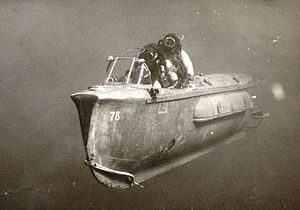 Gibraltar and elsewhere.
Gibraltar and elsewhere.
Deeply angered, the British avenged themselves against the Italians, by sinking the new Italian cruiser Ulpio Traiano in the port of Palermo, Sicily, in early January 1943. An 8,500-ton ocean liner was also damaged in the same attack. After the Italian surrender, the use of the manned torpedo continued to be used by both the British, and later the Germans. In fact, Germany succeeded in sinking two British minesweepers off Normandy Beach in July 1944, using their “Neger” torpedoes. These would be the best torpedo, until the guidance systems could be invented.
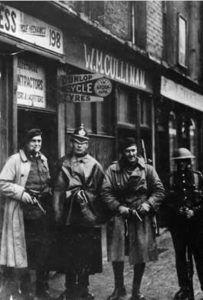 In 1536, Henry VIII decided to conquer Ireland and bring it under crown control. From that time forward until 1920, all of Ireland was a part of the British Isles. The British Isles is a geographical term which includes two large islands, Great Britain and Ireland, and 5,000 small islands, most notably the Isle of Man which has its own parliament and laws. Today, only Northern Ireland remains, as part of the United Kingdom.
In 1536, Henry VIII decided to conquer Ireland and bring it under crown control. From that time forward until 1920, all of Ireland was a part of the British Isles. The British Isles is a geographical term which includes two large islands, Great Britain and Ireland, and 5,000 small islands, most notably the Isle of Man which has its own parliament and laws. Today, only Northern Ireland remains, as part of the United Kingdom.
For the most part, the Irish War of Independence, also called the Anglo-Irish War, was a guerrilla conflict and most of the fighting was conducted on a small scale by the standards of conventional warfare. Although there were some large-scale encounters between the Irish Republican Army and the state forces of the United Kingdom. The Auxiliary Division of the Royal Irish Constabulary (ADRIC), generally known as the Auxiliaries or Auxies, was a paramilitary unit of the Royal Irish Constabulary (RIC) during the War. It was set up in July 1920 and made up of former British Army officers, most of whom came from Great Britain. Its role was to conduct counter-insurgency operations against 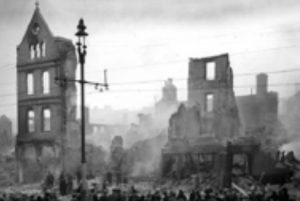 the Irish Republican Army (IRA). The Auxiliaries became infamous for their reprisals on civilians and civilian property in revenge for IRA actions, the best known example of which was the burning of Cork city in December 1920. The Black and Tans officially the Royal Irish Constabulary Special Reserve, was a force of temporary constables recruited to assist the Royal Irish Constabulary (RIC) during the war. The force was the brainchild of Winston Churchill, then British Secretary of State for War. Recruitment began in Great Britain in late 1919. Thousands of men, many of them British Army veterans of World War I, answered the British government’s call for recruits.
the Irish Republican Army (IRA). The Auxiliaries became infamous for their reprisals on civilians and civilian property in revenge for IRA actions, the best known example of which was the burning of Cork city in December 1920. The Black and Tans officially the Royal Irish Constabulary Special Reserve, was a force of temporary constables recruited to assist the Royal Irish Constabulary (RIC) during the war. The force was the brainchild of Winston Churchill, then British Secretary of State for War. Recruitment began in Great Britain in late 1919. Thousands of men, many of them British Army veterans of World War I, answered the British government’s call for recruits.
The war continued on and by November 1920, around 300 people had been killed in the conflict. Then, there 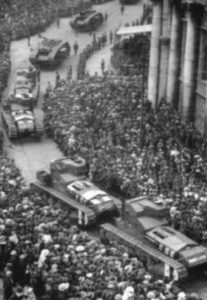 was an escalation of violence beginning on Bloody Sunday, November 21, 1920, fourteen British intelligence operatives were assassinated in Dublin in the morning. Then, in retaliation, the afternoon the RIC opened fire on a crowd at a Gaelic football match in the city, killing fourteen civilians and wounding 65. A week later, seventeen Auxiliaries were killed by the IRA in the Kilmichael Ambush in County Cork. In retaliation, the British government declared martial law in much of southern Ireland. The centre of Cork City was burnt out by British forces on December 10, 1920. Violence continued to escalate over the next seven months, when 1,000 people were killed and 4,500 republicans were interned. Much of the fighting took place in Munster (particularly County Cork), Dublin and Belfast, which together saw over 75 percent of the conflict deaths. Violence in Ulster, especially Belfast, was notable for its sectarian character and its high number of Catholic civilians.
was an escalation of violence beginning on Bloody Sunday, November 21, 1920, fourteen British intelligence operatives were assassinated in Dublin in the morning. Then, in retaliation, the afternoon the RIC opened fire on a crowd at a Gaelic football match in the city, killing fourteen civilians and wounding 65. A week later, seventeen Auxiliaries were killed by the IRA in the Kilmichael Ambush in County Cork. In retaliation, the British government declared martial law in much of southern Ireland. The centre of Cork City was burnt out by British forces on December 10, 1920. Violence continued to escalate over the next seven months, when 1,000 people were killed and 4,500 republicans were interned. Much of the fighting took place in Munster (particularly County Cork), Dublin and Belfast, which together saw over 75 percent of the conflict deaths. Violence in Ulster, especially Belfast, was notable for its sectarian character and its high number of Catholic civilians.
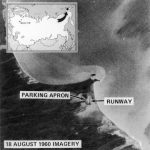 The Nazi bombers were notorious for their sneaky bomber raid, especially the night bombings. The British decided that it was time for start fighting back. So they came up with the idea of using German speaking individuals to impersonate German air controllers, broadcasting false orders to confuse German fighter pilots. The plan was called Operation Corona, and the scope of the operation was massive, but ironically, it was only made possible because of German-speaking Jewish refugees who had escaped Germany and settled in Britain. What an amazing way for the Jewish refugees to be able to get back at the Nazis for the horrid treatment they had received and that they had escaped thankfully. Now, these refugees were breaking into Luftwaffe radio channels and playing wreaking havoc on the Luftwaffe’s ability to direct their night fighters.
The Nazi bombers were notorious for their sneaky bomber raid, especially the night bombings. The British decided that it was time for start fighting back. So they came up with the idea of using German speaking individuals to impersonate German air controllers, broadcasting false orders to confuse German fighter pilots. The plan was called Operation Corona, and the scope of the operation was massive, but ironically, it was only made possible because of German-speaking Jewish refugees who had escaped Germany and settled in Britain. What an amazing way for the Jewish refugees to be able to get back at the Nazis for the horrid treatment they had received and that they had escaped thankfully. Now, these refugees were breaking into Luftwaffe radio channels and playing wreaking havoc on the Luftwaffe’s ability to direct their night fighters.
On one night in 1943, the British managed to get almost all the German night fighters to fly home, and only one aircraft was lost during that night. Another night, a German night fighter, who was already lost, was redirected to a British airfield and captured. I can’t imagine what was going on in the minds of the commanding officers in charge of the night fighters. Their men were presumably, totally mixed up, and every mission failed to bring the desired result.
For me, the most amazing part has to do with the Jewish involvement. Hitler was so intent on killing the Jewish 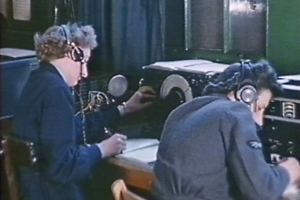 people, and in this instance, it was a group of Jewish people who were able to pull of a great victory over Hitler and his night fighter pilots. Operation Corona was made possible because before the war many people, mostly Jews, fled Nazi Germany to England, and I seriously doubt if Hitler ever knew what happened, but those people who were involved knew, and while they were not able to help their own people directly, I’m sure it gave them some satisfaction to know that they were doing their part to fight against the horrible dictator who was responsible for the deaths of so many of their people. Operation Corona gave them the opportunity they needed to do something big to help in ending the war and bringing victory to the Allies, thereby helping many of their own people too.
people, and in this instance, it was a group of Jewish people who were able to pull of a great victory over Hitler and his night fighter pilots. Operation Corona was made possible because before the war many people, mostly Jews, fled Nazi Germany to England, and I seriously doubt if Hitler ever knew what happened, but those people who were involved knew, and while they were not able to help their own people directly, I’m sure it gave them some satisfaction to know that they were doing their part to fight against the horrible dictator who was responsible for the deaths of so many of their people. Operation Corona gave them the opportunity they needed to do something big to help in ending the war and bringing victory to the Allies, thereby helping many of their own people too.
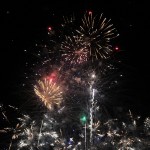 I think that one of the things most people look forward to in mid-summer is Independence Day. Of course, the normal holiday for many people is filled with picnics, fireworks, and celebration of our freedom. Many of us consider the price that was paid in the Revolutionary War to win our freedom from England, and then our thoughts move on to the many wars the United Stares has fought into keep our freedoms, and to win freedom for oppressed nations around the world. It’s a noble thing our soldiers do, often with little thanks from those they help. And all too often, their work is quickly forgotten or even protested by those who do not understand how important it is not to give away our freedoms to those who do not share our values.
I think that one of the things most people look forward to in mid-summer is Independence Day. Of course, the normal holiday for many people is filled with picnics, fireworks, and celebration of our freedom. Many of us consider the price that was paid in the Revolutionary War to win our freedom from England, and then our thoughts move on to the many wars the United Stares has fought into keep our freedoms, and to win freedom for oppressed nations around the world. It’s a noble thing our soldiers do, often with little thanks from those they help. And all too often, their work is quickly forgotten or even protested by those who do not understand how important it is not to give away our freedoms to those who do not share our values.
Whatever a person’s politics are, or even if they don’t participate at all, pretty much 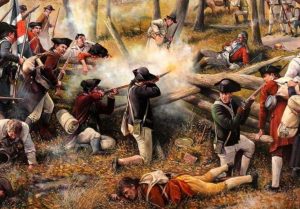 everyone celebrates Independence Day. It is a beloved holiday in this country. It’s a day to celebrate who we are as a nation….the land of the free, and the home of the brave. The fireworks are to remember the rockets that were used in the battle for our independence. The patriot soldiers fought hard against the British, never giving up, even if they lost their lives in the battle. The danger was worth the risk. They could no longer be slaves to the British. They were being taxed without representation, and unmercifully. It was time for the United States to become it’s own nation. I don’t think the British have any inkling that they would lose the Revolutionary War. It was like being beaten by your child. How could that “kid” actually have grown enough to beat them…and yet, the “kid” had not only fought against the “parent” country, but they won. They fought and now we’re free!!
everyone celebrates Independence Day. It is a beloved holiday in this country. It’s a day to celebrate who we are as a nation….the land of the free, and the home of the brave. The fireworks are to remember the rockets that were used in the battle for our independence. The patriot soldiers fought hard against the British, never giving up, even if they lost their lives in the battle. The danger was worth the risk. They could no longer be slaves to the British. They were being taxed without representation, and unmercifully. It was time for the United States to become it’s own nation. I don’t think the British have any inkling that they would lose the Revolutionary War. It was like being beaten by your child. How could that “kid” actually have grown enough to beat them…and yet, the “kid” had not only fought against the “parent” country, but they won. They fought and now we’re free!!
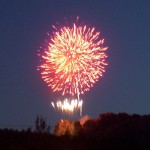
Since they won, we have something wonderful to celebrate on July 4th…our independence. When I think of the alternative, I cringe. It’s not that I hate England, because, in fact, I don’t. I have relatives there, including in the royal family, so I don’t hate England, but we were just different. Our values and ideals were different. We could not peacefully co-exist the way we were, And yet, now that we are two separate nations, we are allies. We had to be equals in order to be allies. We had to have their respect, as a free nation, and we got it. We have been a respected, free nation since that day…July 4, 1776. And that is why we still celebrate our independence. Happy Independence Day everyone!!
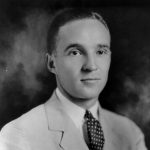
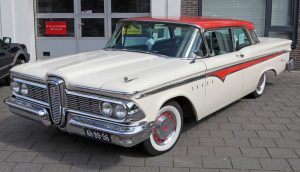 Despite having a domineering father, who was never pleased with anything he did, Edsel Ford, the son of the founder of Ford Motors is mainly remembered for the Edsel, a failed 1958-60 car model. In reality, he was one of the masterminds of the Allied victory in World War II. Against the wishes of his father, Edsel Ford telephones William Knudsen of the U.S. Office of Production Management on June 12, 1940, to confirm Ford Motor Company’s acceptance of Knudsen’s proposal to manufacture 9,000 Rolls-Royce-designed engines to be used in British and United States airplanes. In all, they would build, 9,000 B-24 Liberator bombers, 278,000 Jeeps, 93,000 military trucks, 12,000 armored cars, 3,000 tanks, and 27,000 tank engines, but it was not without a few stumbling blocks. Edsel and Charles Sorensen, Ford’s production chief, had apparently gotten the go-ahead from Henry Ford by June 12, when Edsel telephoned Knudsen to confirm that Ford would produce 9,000 Rolls-Royce Merlin airplane engines (6,000 for the RAF and 3,000 for the U.S. Army). However, as soon as the British press announced the deal, Henry Ford personally and publicly canceled it, telling a reporter: “We are not doing business with the British government or any other government.”
Despite having a domineering father, who was never pleased with anything he did, Edsel Ford, the son of the founder of Ford Motors is mainly remembered for the Edsel, a failed 1958-60 car model. In reality, he was one of the masterminds of the Allied victory in World War II. Against the wishes of his father, Edsel Ford telephones William Knudsen of the U.S. Office of Production Management on June 12, 1940, to confirm Ford Motor Company’s acceptance of Knudsen’s proposal to manufacture 9,000 Rolls-Royce-designed engines to be used in British and United States airplanes. In all, they would build, 9,000 B-24 Liberator bombers, 278,000 Jeeps, 93,000 military trucks, 12,000 armored cars, 3,000 tanks, and 27,000 tank engines, but it was not without a few stumbling blocks. Edsel and Charles Sorensen, Ford’s production chief, had apparently gotten the go-ahead from Henry Ford by June 12, when Edsel telephoned Knudsen to confirm that Ford would produce 9,000 Rolls-Royce Merlin airplane engines (6,000 for the RAF and 3,000 for the U.S. Army). However, as soon as the British press announced the deal, Henry Ford personally and publicly canceled it, telling a reporter: “We are not doing business with the British government or any other government.”
Unlike other automakers, Ford had already built a successful airplane in the 1920s called the Tri-Motor. That fact made them the logical choice when the war effort needed more planes. In two meetings in late May and early June 1940, Knudsen and Edsel Ford agreed that Ford would manufacture the new fleet of aircraft for the RAF on an expedited basis. The one significant obstacle was Edsel’s father Henry Ford, who still retained complete control over the company he founded, even though he had turned the figurehead control over to his son. Henry Ford was well known for his opposition to the possible U.S. entry into World War II, so it would be up to Edsel to convince him that it was necessary.
According to Douglas Brinkley’s biography of Ford, “Wheels for the World,” Henry Ford had in effect already accepted a contract from the German government. The Ford subsidiary Ford-Werke in Cologne was doing business with the Third Reich at the time, which Ford’s critics took as proof that he was concealing a pro-German bias behind his claims to be a man of peace. Nevertheless, as U.S. entry into the war became more of 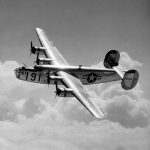
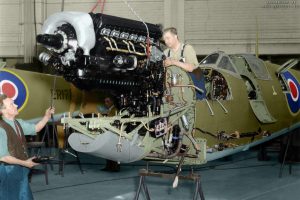 a certainty, Ford reversed his position, and the company opened a large new government-sponsored facility at Willow Run, Michigan in May of 1941, for the purposes of manufacturing the B-24E Liberator bombers for the Allied war effort. Ford Motor plants also produced a great deal of other war materiel during World War II, including a variety of engines, trucks, jeeps, tanks and tank destroyers. The production needs met by Ford Motor Company during World War II were instrumental in the Allied victory in that war.
a certainty, Ford reversed his position, and the company opened a large new government-sponsored facility at Willow Run, Michigan in May of 1941, for the purposes of manufacturing the B-24E Liberator bombers for the Allied war effort. Ford Motor plants also produced a great deal of other war materiel during World War II, including a variety of engines, trucks, jeeps, tanks and tank destroyers. The production needs met by Ford Motor Company during World War II were instrumental in the Allied victory in that war.
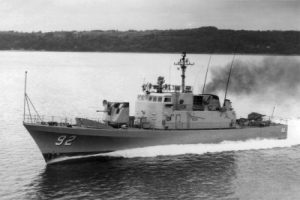 Would you want your nation to go to war over fish? Would you even consider that nations might do that? Well, enter the Cod Wars. The Cod Wars were disputes over Iceland’s territorial waters, fought in four bouts over a 25 year period: The Proto Cod War, between 1952 and 1956; the First Cod War between 1958 and 1961; the Second Cod War between 1972 and 1973; and the Third Cod War between 1975 and 1976. Iceland wanted to expand its territorial waters and exclude foreign fishing fleets. Britain would have none of that. The British distant fishing fleet fished extensively in the waters off Iceland, and supplied a lot of fish and chips shops. But Britain also wanted to prevent precedents that violated the principle of narrow territorial waters. Narrow territorial waters were key for the Royal Navy to sail freely and continue to project power across the world. The Icelanders were motivated by the prospective economic gains. An extension of its territorial waters meant greater catches, and a way to exclude competing trawler fleets and conserve important fishing grounds. The country’s heavy dependence on fishing meant that extensions had a significant impact on Iceland’s Gross Domestic Product, roughly one-quarter of which was tied to the fisheries sector, export earnings one-half to two-thirds of which were tied to the fisheries sector and employment roughly 15 percent of which was in the fisheries sector.
Would you want your nation to go to war over fish? Would you even consider that nations might do that? Well, enter the Cod Wars. The Cod Wars were disputes over Iceland’s territorial waters, fought in four bouts over a 25 year period: The Proto Cod War, between 1952 and 1956; the First Cod War between 1958 and 1961; the Second Cod War between 1972 and 1973; and the Third Cod War between 1975 and 1976. Iceland wanted to expand its territorial waters and exclude foreign fishing fleets. Britain would have none of that. The British distant fishing fleet fished extensively in the waters off Iceland, and supplied a lot of fish and chips shops. But Britain also wanted to prevent precedents that violated the principle of narrow territorial waters. Narrow territorial waters were key for the Royal Navy to sail freely and continue to project power across the world. The Icelanders were motivated by the prospective economic gains. An extension of its territorial waters meant greater catches, and a way to exclude competing trawler fleets and conserve important fishing grounds. The country’s heavy dependence on fishing meant that extensions had a significant impact on Iceland’s Gross Domestic Product, roughly one-quarter of which was tied to the fisheries sector, export earnings one-half to two-thirds of which were tied to the fisheries sector and employment roughly 15 percent of which was in the fisheries sector.
Each Cod War broke out when Iceland extended its territorial waters and the British failed to comply with the new Icelandic regulations. Clashes and confrontations started between Icelandic patrol ships and British trawlers. The harassment of British trawlers in the contested waters provoked the British to sanction the Icelanders in the Proto Cod War preventing the Icelanders from accessing their largest export market and send the Royal Navy into the contested waters during the last three Cod Wars. Neither side actively tried to cause casualties but the clashes at sea were still dangerous. I can’t imagine a war, in which the combatants try not to 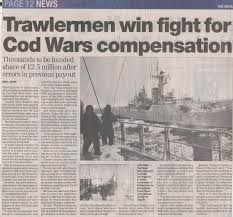 hurt each other. Nevertheless, individuals were injured, and there was one fatality on the Icelandic side. Surely bargaining would have saved both sides the inevitable costs and risks of unilateral, unrecognized expansions. Historians and political scientists have identified how domestic pressure on elites and the nature of alliance politics contributed to miscalculation on both sides that contributed to bargaining failure.
hurt each other. Nevertheless, individuals were injured, and there was one fatality on the Icelandic side. Surely bargaining would have saved both sides the inevitable costs and risks of unilateral, unrecognized expansions. Historians and political scientists have identified how domestic pressure on elites and the nature of alliance politics contributed to miscalculation on both sides that contributed to bargaining failure.
Neither government really understood the public pressure that their counterparts were under. Icelandic politicians were particularly vulnerable to domestic pressure, as opposition parties, media and public sentiment likened compromise to treason. Contradictory statements from different members of the Icelandic government, diplomats and other elites contributed to the mistaken British view that the Icelanders were divided and not fully committed to expansive and legally dubious extensions. The British trawling industry, which had a staunch ally in the Ministry of Agriculture and Fisheries, put great pressure on the British government. The Ministry favored aggressive and extreme actions in the disputes, while the Foreign Office was more conciliatory and concerned about the Cod Wars’ impact on British security interests and international standing. The Icelanders deemed it unlikely that their NATO ally and friend would sanction the Icelanders or send in the Royal Navy. Both sides also believed that the United States and other NATO allies would side with them. Even though the American position on territorial waters tended to line up with the British view, and the United States opposed Iceland’s unilateralism, the United States ultimately intervened on Iceland’s behalf. They had a stake in the outcome. The United States bought up unsold Icelandic fish, making the British sanctions toothless in the Proto Cod War. The United States pressured Britain behind the scenes in the last three Cod Wars. At stake was a strategically important United States base in Keflavík, which was needed to track Soviet submarine activity. For the United States, Iceland was an important chain in the line of defense in case of war with the Soviet Union.
Neither Iceland or Britain found the other’s threats and demands credible prior to the outbreak of conflict. However, as each Cod War intensified and Icelandic statesmen came under major domestic pressure, they found themselves forced to threaten to withdraw Iceland’s NATO membership and expel United States forces from the military base in Keflavík in desperate attempts to push the British to give in to Iceland’s demands. 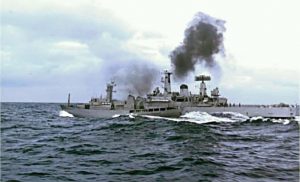 What started as minor disputes over fishing rights suddenly had implications for the Cold War. President Eisenhower…during the Proto Cod War…and Secretary of State Henry Kissinger…during the Second Cod War…talked about the Icelanders in terms of the “tyranny of the weak,” as they felt compelled to oblige their small, obstinate, strategically important ally. With NATO allies heaping pressure on the British. to settle and Icelandic politicians clearly constrained by public pressure, the British reluctantly gave in to most of the Icelanders’ demands. Iceland achieved favorable agreements in each Cod War, with the last Cod War concluding 40 years ago when the Icelanders achieved a 200-mile exclusive economic zone.
What started as minor disputes over fishing rights suddenly had implications for the Cold War. President Eisenhower…during the Proto Cod War…and Secretary of State Henry Kissinger…during the Second Cod War…talked about the Icelanders in terms of the “tyranny of the weak,” as they felt compelled to oblige their small, obstinate, strategically important ally. With NATO allies heaping pressure on the British. to settle and Icelandic politicians clearly constrained by public pressure, the British reluctantly gave in to most of the Icelanders’ demands. Iceland achieved favorable agreements in each Cod War, with the last Cod War concluding 40 years ago when the Icelanders achieved a 200-mile exclusive economic zone.

